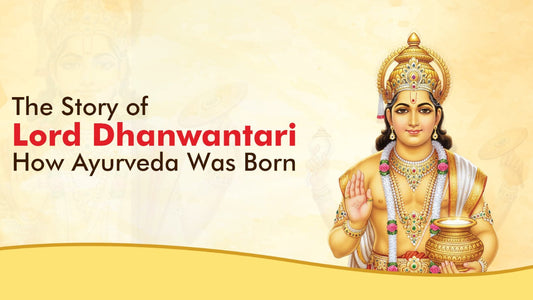The Story of Lord Dhanvantari: How Ayurveda Was Born

In Indian culture, health has always been regarded not merely as a physical condition but as the foundation of life itself. Whenever health, well-being, and healing are discussed, the name of Lord Dhanvantari is invoked first. He is revered as the God of Ayurveda an incarnation of Lord Vishnu, who appeared on earth to eliminate imbalance, disease, and suffering. His divine mission was to bless humanity with the nectar of balance, health, and longevity.
Lord Dhanvantari’s First Incarnation – Appearance from the Samudra Manthan
The ancient story of the Samudra Manthan (Churning of the Ocean) is not merely a religious legend it symbolizes the balance of the universe and the search for immortality. The gods and demons decided to churn the Kshirsagar (Ocean of Milk) to obtain the nectar of immortality hidden within it. Under the guidance of Lord Vishnu, Mount Mandara was used as the churning rod, and the serpent Vasuki served as the rope.
As the churning began, numerous divine treasures, medicinal herbs, gems, and celestial beings emerged. Then appeared Lord Dhanvantari, holding in his four hands the Amrit Kalash (pot of nectar), a conch, a discus, and medicinal herbs. His appearance symbolized not only the nectar of immortality but also the knowledge of health and healing. Through him, the world received Ayurveda the eternal science of life.
Mohini Avatar and the Distribution of Amrita
When Lord Dhanvantari emerged with the Amrit Kalash, the demons rushed to seize it. To restore balance, Lord Vishnu took the form of Mohini, the divine enchantress. Using her grace and wisdom, Mohini distracted the demons and distributed the nectar only to the gods.
This story carries a deeper message—that power without balance and discretion can lead to destruction. Only when guided by wisdom can strength serve the good of all.
Second Incarnation – Teacher of Ayurveda on Earth
Ayurveda, bestowed by Lord Dhanvantari, is not merely the science of medicine—it is the science of life. The word Ayu means life, and Veda means knowledge. Ayurveda teaches the harmony of body, mind, and spirit. According to it, health depends on the balance of the three doshas—Vata, Pitta, and Kapha—while their imbalance causes disease.
In the Dwapara Yuga, Lord Dhanvantari was born as the son of King Dirghatama. From childhood, he performed penance and gained mastery over the science of Ayurveda. Under his guidance, the medical system was expanded, emphasizing the holistic balance of body, mind, and soul. The foundational texts of Ayurveda - Sushruta Samhita, Charaka Samhita, and others—are rooted in his divine teachings.
The Eight Branches of Ayurveda (Ashtanga Ayurveda)
-
Shalya Chikitsa – Surgery and surgical treatments
-
Kayachikitsa – Treatment of general physical ailments
-
Kaumarbhritya – Pediatrics
-
Shalakya Tantra – Diseases of the eye, ear, nose, and throat
-
Bhoot Vidya – Mental and spiritual healing
-
Agad Tantra – Treatment of poisons and toxic conditions
-
Vajikarana Tantra – Reproductive health and vitality
-
Rasayana Tantra – Longevity and rejuvenation
Philosophy and Principles of Ayurveda
Ayurveda is not limited to curing illness - it aims to prevent disease and enhance the quality of life.
It teaches that:
-
The balance of the three doshas is essential for good health.
-
The Panchamahabhuta theory (five elements—earth, water, fire, air, and space) explains the deep connection between humans and nature.
-
A balanced diet, lifestyle, and mental state are vital to maintaining harmony between body, mind, and spirit.
Harmony of Life and Nature
In Ayurveda, living in harmony with nature is considered the best medicine. Proper sleep, a wholesome diet, regular routines, and peace of mind are the pillars of a healthy life.
Ayurveda believes that treatment should be personalized, according to one’s unique constitution (Prakriti). This makes it the oldest and most comprehensive medical system in the world. Lord Dhanvantari’s teachings emphasize ethical medicine, a balanced lifestyle, and positive thinking, reminding us that “Health is not just of the body, but also of the mind and soul.”
Lord Dhanvantari’s Teachings in the Modern World
In today’s world, filled with pollution, stress, and unhealthy habits, the message of Lord Dhanvantari is more relevant than ever:
“Health is not just about the body, but about the mind and spirit.”
Ayurveda complements modern medicine by focusing on root-cause healing through natural herbs, preventive care, and lifestyle-based therapies.
Dhanteras and Lord Dhanvantari Jayanti
The festival of Dhanteras, celebrated two days before Diwali, marks the birth of Lord Dhanvantari. On this day, he emerged from the ocean with the pot of nectar and blessed the world with health and vitality.
Dhanteras reminds us that health is true wealth. Those who embrace wholesome food, natural remedies, and mental peace are the ones truly blessed with prosperity and well-being.
Conclusion
Lord Dhanvantari and the divine science of Ayurveda teach that health is humanity’s greatest treasure. Remembering him on Dhanteras and following a balanced, natural, and mindful lifestyle lead to longevity and prosperity. Worshiping Lord Dhanvantari brings not only physical wellness but also mental and spiritual harmony.
Most Searches : Baidyanath, Ayurvedic liver tonic, Mahamanjisthadi kwath, Badam tel, Giloy juice benefits, Amritarishta syrup, Swarna Bhasma, Amalki Rasayan, Chandanasava, Mahabhringraj hair oil, Khadirarishta syrup.
No comments











0 comments